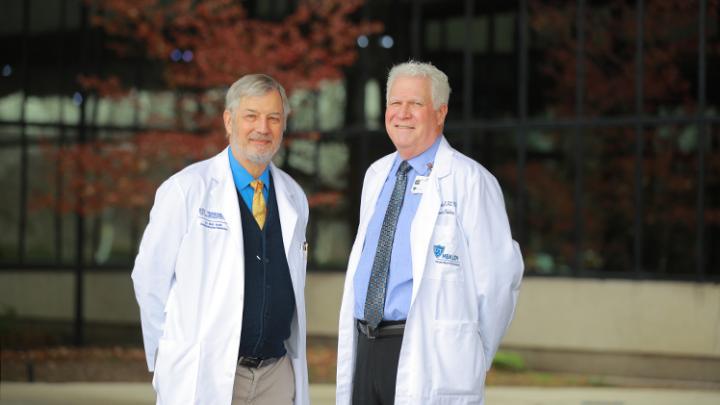Persistent work from scientists at The University of Toledo could aid in diagnosing and treating postural orthostatic tachycardia syndrome

Credit: Daniel Miller / The University of Toledo
The symptoms of postural orthostatic tachycardia syndrome, or POTS, can be as varied as they are confounding.
There can be fatigue, pain, bleeding disorders and anxiety. Heart palpitations and lightheadedness are common. Some patients experience gastrointestinal issues or brain fog. For the most severely affected, the simple act of standing up can send them crumpling into unconsciousness.
Though likely much more common than once thought, POTS remains something of a mystery. Many physicians have never heard of it. There’s no lab test to confirm a diagnosis and no treatment to cure the condition.
That could all be changing, owed in large part to the persistence of researchers Dr. William Gunning and Dr. Blair Grubb from The University of Toledo.
“For a long time, people would question whether this disorder even existed,” said Grubb, a cardiologist at The University of Toledo Medical Center and Distinguished University Professor in the UToledo College of Medicine and Life Sciences.
Grubb, who has been treating POTS patients and studying the condition for more than three decades, now believes he and his collaborators are increasingly close to proving a long-held theory that POTS is an autoimmune disorder.
He and Gunning, a professor of pathology in the UToledo College of Medicine and Life Sciences whose expertise is in platelet disorders, are collaborating on innovative research examining patients’ plasma for autoantibodies and inflammatory markers.
In a retrospective study of 34 POTS patients, Gunning, Grubb and a team of UToledo scientists documented a significant elevation of five inflammatory markers characteristic of an innate immune condition.
“This is a tremendous step forward,” Grubb said. “Not only does this work give additional credence to the existence of POTS, we have an idea of pathophysiology and would potentially have a very simple diagnostic test. We don’t yet have that with POTS, but these studies suggest we are getting close.”
The inflammatory markers identified in the research — a mixture of specific cytokines and chemokines — are similar to those seen in patients with other autoimmune disorders, including psoriasis, multiple sclerosis and rheumatoid arthritis.
The paper, published in the journal Clinical Medicine, builds on years of research led by Gunning and Grubb. In 2019, the duo published what was at the time the largest study of POTS patients to date, finding 89% of patients had elevated levels of autoantibodies against the adrenergic alpha 1 receptor.
Taken together, the two publications are among the strongest evidence yet that POTS is an autoimmune disorder.
Grubb and Gunning also have hypothesized that POTS may be initiated by a viral infection.
“There are a number of patients previously diagnosed with COVID-19 being labeled ‘long-haulers.’ They develop similar symptoms to POTS and many have even been diagnosed with POTS post-COVID,” Gunning said. “We don’t know whether POTS is acquired or inherited, but viral infections cannot be dismissed as an initiating event in the development of POTS.”
While they have yet to test the theory, Grubb and Gunning have observed recent Epstein-Barr viral infections in many patients’ medical histories.
“The development of POTS post-COVID is an additional piece of evidence that a viral infection might start a cascade of chemicals produced by the innate immune system in the development of autoantibodies,” Gunning said.
While additional research is needed to further validate the study’s findings on inflammatory markers and expand the investigation to additional markers, the implications of the study are significant.
Currently physicians are only able to treat the symptoms of POTS. If POTS is confirmed as an autoimmune disorder, knowing the specific inflammatory markers that are engaged could help to direct treatments for the underlying condition itself.
For Grubb, who has dedicated much of his career to caring for POTS patients and is recognized as one of the world’s foremost experts in syncope and disorders of the autonomic nervous system, these new discoveries show the value of perseverance.
“The pace of POTS research has accelerated exponentially. Part of that is having new technology that allows us to do this research, but it’s also a function of the collaboration we have at this institution,” he said. “We have been on the forefront of new innovations and research in the POTS field, and we are making real progress.”
###
Media Contact
Tyrel Linkhorn
[email protected]
Related Journal Article
http://dx.




